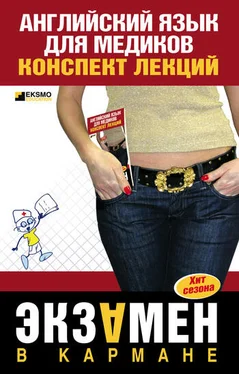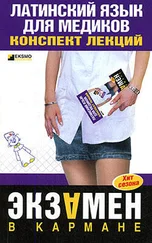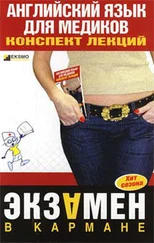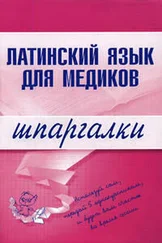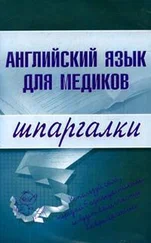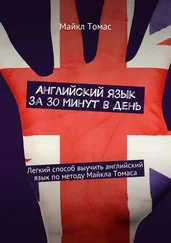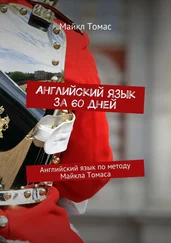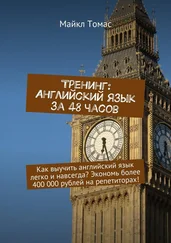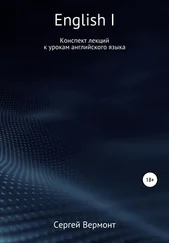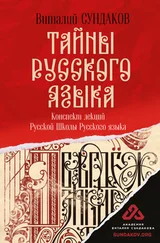Елена Беликова
Английский язык для медиков: конспект лекций
ВВОДНАЯ ЛЕКЦИЯ History of medicine
Medicine is among the most ancient of human occupations. It began as an art and gradually developed into a science over the centuries. There are 3 main stages in medicine development: Medicine of Ancient Civilizations, Medicine of Middle Ages and Modern Medicine.
Early man, like the animals, was subject to illness and death. At that time medical actions were mostly a part of ceremonial rituals. The medicine-man practiced magic to help people who were ill or had a wound. New civilizations, which developed from early tribes, began to study the human body, its anatomic composition. Magic still played an important part in treating but new practical methods were also developing. The early Indians, e. g., set fractures and practiced aromatherapy. The Chinese were pioneers of immunization and acupuncture. The contribution of the Greeks in medicine was enormous. An early leader in Greek medicine was Aesculapius. His daughters, Hygeia and Panacea gave rise to dynasties of healers (curative medicine) and hygienists (preventive medicine). The division in curative and preventive medicine is true today. The ethic principles of a physician were summarized by another Greek, Hippocrates. They are known as Hippocrates Oath.
The next stage of Medicine's development was the Middle Ages. A very important achievement of that time was the hospital. The first ones appeared in the 15-th century in Oriental countries and later in Europe. Another advance of the Middle Ages was the foundation of universities during 13-14-th centuries. Among other disciplines students could study medicine. During 18-th century new discoveries were made in chemistry, anatomy, biology, others sciences. The advances of that time were invention of the stethoscope (by Rene Laennec), vaccination for smallpox, discovery of anesthetics and development of immunology and scientific surgery.
The next century is rise of bacteriology. Important discoveries were made by Louis Pasteur and Robert Koch. The development of scientific bacteriology made possible advances in surgery: using antiseptics and control of wound infection.
Medicine in the 20-th century made enormous contribution in the basic medical sciences. These are discovery of blood groups and vitamins, invention of insulin and penicillin, practice of plastic surgery and transplantation.
New words
medicine – медицина
ancient – древний
human – человеческий
occupation – занятие
art – искусство
to develop – развивать
science – наука
century – век
civilization – цивилизация
Middle аges – Средние века
modern – современный
animal – животное
subject – предмет
illness – заболевание
death – смерть
contribution – вклад
discovery – открытие
blood – кровь
Артикли
Перед каждым нарицательным существительным должен стоять артикль. В английском языке существуют два вида артиклей: неопределенный (indefinite) «А», «AN» и определенный (definite) «THE». Если слово употребляется в первый раз, используется неопределенный артикль» «А», «AN». Во второй и последующие разы употребляется определенный артикль «THE». Артикль не употребляется, если перед существительным стоит притяжательное или указательное местоимение, другое существительное в притяжательном падеже, количественное числительное или отрицание «ио».
Вставьте артикль, где необходимо.
1. This is… book. It s my… book.
2. Is this your… pencil? No, it is not my pencil, it is my sister's pencil.
3. I have… sister. My… sister is… engineer. My sister's… husband is… doctor.
4. I have no. handbag.
5. Is this… watch?
– No, it isn't… watch, it's… pen.
6. This… pen is good, and that… pen is bad.
7. I can see pencil on your… table, but I can see pencil on, but I can see no… paper.
8. Give me… chair, please.
9. They have… dog and two… cats.
10. I have… spoon in my… plate, but I have no… soup in it.
Answer the questions.
1. When the history of medicine began?
2. How did it begin?
3. How many the main stages are there in the history of medicine?
4. What practices medicine-men?
5. What role did magic play at those times?
6. Who began to study medicine?
7. Who were the pioneers of immunization and acupuncture?
8. Who was the early leader in Greek medicine?
9. When appeared the first hospitals?
10. What Louis Pasteur and Robert Koch discovered?
Make the sentences of your own using the new words (10 sentences).
Find the definite and indefinite articles in the text.
Find one word, which is a little bit different in meaning from others (найдите одно слово, которое немного отличается от других по смыслу):
1) a) medicine; b) theatre; c) doctor;
2) a) patient; b) lamp; c) pain;
3) a) dance; b) science; c) studying;
4) a) mushroom; b) human; c) man;
5) a) century; b) age; c) honey.
The cell is a smallest independent unit in the body containing all the essential properties of life. types of human cells can be grown in test tubes after beeing taken from the body. Cells which are functionally organized are often grouped together and operate in concert as a tissue, such as muscle tissue or nervous tissue. Various tissues may be arranged together to form a unit called organ as the kidney, liver, heart or lungs. Organs often function in groups called organ systems. Thus the esophagus, stomach, раnсreаs, liver and intestines constitute the digestive system.
Cells are characterized Ьуг high degree of complexity and order in both structure and function. The cell contains a number.
Of structures called cell organelles. These are responsible for carrying out the specialized biochemical reactions characterizing each. The many chemical reactions taking place in a cell require the establishment of varied chemical microenvironment.
Carefully controlled transport mechanisms along with highly effective barriers – the cell membranes – ensure that chemicals are present in the proper region of the call in appropriate concentration.
The cell membranes of a mixture of protein and lipid form its surroundings.
Membranes are an essential component of almost all cells organel-les. The membrane allows only certain molecules to pass through it.
The most visible and essential organelle in a cell is the nucleus, containing genetic material and regulating the activities of the entire cell.
The area outside of the molecules is called the cytoplasm. Cytoplasm contains a variety of organelles that have different functions.
New words
cell – клетка
independent – независимый
unit – единица
body – тело
all – все
Читать дальше
